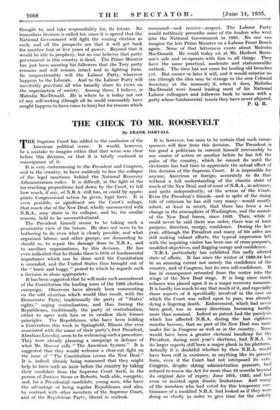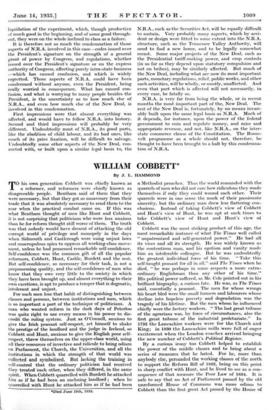THE CHECK TO MR. ROOSEVELT
By FRANK DARVALL
THE Supreme Court has added to the confusion of the American political scene. It would, however, be a mistake to imagine either that that scene was clear before this decision, or that it is fatally confused in consequence of it.
It is very embarrassing to the President and Congress, and to the country, to have suddenly to face the collapse of the legal sanctions behind the National Recovery Administration codes. It is difficult, in the light of the far-reaching propositions laid down by the Court, to tell how much, if any, of N.R.A. still has, or could by appro- priate Congressional action be given, legal force. It is even possible, so significant are the Court's rulings, that much else of the New Deal, wholly unconnected with N.R.A., may share in its collapse, and be, for similar reasons, held to be unconstitutional.
The President himself seems to be taking such a pessimistic view of the future. He does not seem to be bothering to do even what is clearly possible, and what organized labour, and other groups, are demanding he should so, to repair the damage done to N.R.A., and to ancillary organizations, by this decision. He has even indicated that he thinks there is little of fundamental importance which can be done until the Constitution is amended, and the United States thus brought out of the " horse and buggy " period to which he regards such a decision as alone appropriate.
It has been suggested that he will make such amendment of the Constitution the leading issue of the 1986 election campaign. Observers have already been commenting on the odd situation which would thus result, with the Democratic Party, traditionally the party of "States'.
rights," urging centralization, and thus forcing the Republicans, traditionally the party of centralization, either to agree with him or to swallow their former principles. The Republicans, who have been holding a Convention this week in Springfield, Illinois (for ever associated with the name of their party's _first President, Abraham Lincoln), seem to be welcoming such a procedure.
They were already planning a campaign in defence of what Mr. Hoover calls " The American System." It is suggested that they would welcome a clear-cut fight on the issue of " The Constitution versus the New Deal." It is, indeed, already being rumoured that they might
help to force such an issue before the country by taking their candidate from the Supreme Court itself, in the person of Justices Stone or Roberts, both able, energetic, and, for a Presidential candidate, young men, who have the advantage of being regular Republicans and also, by contrast with other members of the Supreme Court, and of the Republican Party, liberal in outlook.
It is, however, too soon to be certain that such conse- quences will flow from this decision. The President is too good a politician to commit himself irrevocably to one course of action or another before he has felt the pulse of the country, which he cannot do until the electorate has had time to appreciate the actual effect of this decision of the Supreme Court. It is impossible for anyone, American or foreign, accurately to do that without a full understanding of the chaotic state of much of the New Deal, and of most of N.R.A., in advance, and quite independently, of the action of the Court. Even the President's friends—and in spite of the rising tide of criticism he has still very many—would mostly admit, at least in secret, that there has been a sad change in the atmosphere of Washington, and the morale of the New Deal forces, since 1933. Then, while it could never be said there was order, there was at least purpose, direction, energy, confidence. During the last year, although the President and many of his aides are still making valiant efforts, the typical impression left with the inquiring visitor has been one of cross-purposes, muddled objectives, and flagging energy and confidence.
N.R.A. particularly has exhibited this sadly altered state of affairs. It has since the winter of 1983-34 lost to an amazing extent not merely the confidence of the country, and of Congress, but its own self-confidence. It has in consequence retreated from the centre into the wings of the New Deal stage. It is long since much reliance was placed upon it as a major recovery measure. It is hardly too much to say that much of it, and especially those aspects of it specifically involved in the case on which the Court was called upon to pass, was already dying a lingering death. Enforcement, which had never been good, was in many directions becoming hardly more than nominal. Indeed so patent had the paralysis which has affected N.R.A. during the last eighteen months become, that no part of the New. Deal was more under fire in Congress as well as in the country. None would have been a greater electoral handicap for. the President, during next year's elections, had N.R.A. in its larger aspects still been a major plank in his platform. Actually it is doubtful whether by then N.R.A. would have been still in existence, in anything like its present form, even if the Court had not interposed its veto. Congress, despite strong administration pressure, had refused to renew the Act for more than 10 months beyond its original date of expiry, June 16th, 1985, and had even so insisted upon drastic limitations. And many of the members who had voted for this temporary con- tinuance of a modified N.R.A. had looked as if they were doing so chiefly in order to give time for the orderly liquidation of the experiment, which, though productive of much good in the beginning, and of some good through- out, they were on the whole inclined to class as a failure.
It is therefore not so much the condemnation of those aspects of N.R.A. involved in this case—codes issued over the President's signature on the strength of a general grant of power by Congress, and regulations, whether issued over the President's signature or on the express authority of Congress, affecting purely intra-state business --which has caused confusion, and which is widely regretted. Those aspects- of N.R.A. could have been condemned 'without anyone, even the President, being really worried in consequence. What has caused con- fusion, and what is worrying to many people besides the President, is the uncertainty as to how much else of N.R.A., and even how much else of the New Deal, is involved in this condemnation.
First impressions were that almost everything was affected, and would have to follow .N.R.A. .into history. Second and third impressions will probably be very different. Undoubtedly most of N.R.A., its good parts, like the abolition of child labour, and its bad ones, like much of its price fixation, will be difficult to salvage. Undoubtedly some other aspects of the New Deal, con- nected with, or built upon a similar legal basis to, the N.R.A., such as the Securities Act, will be equally difficult to sustain. Very probably many aspects, which by acci- dent or design were fitted to some extent into the N.R.A. structure, such as the Tennessee Valley Authority, will need to find a new home, and to be legally somewhat recast. Some major projects of the New Deal, such as the Presidential tariff-making power, and crop controls (in so far as they depend upon statutory compulsion and not on bribes), may be similarly affected. But much of the New Deal, including what are now its most important parts, monetary regulations, relief, public works, and other such activities, will be wholly, or mostly, unaffected. And even that part which is affected will not necessarily, in every case, be fatally so.
N.R.A. is very far from being the whole, or in recent months the most important part of the, New Deal. The rest of the New Deal is, fortunately, by no means invari- ably built upon the same legal basis as N.R.A. Much of it depends, for instance, upon the power of the federal government to coin and regulate money, and raise and appropriate revenue, and not, like N.R.A., on the inter- state commerce clause of the Constitution. The Roose- velt programme as a whole should not, therefore, be thought to have been brought to a halt by this condemna- tion of N.R.A.



















































 Previous page
Previous page